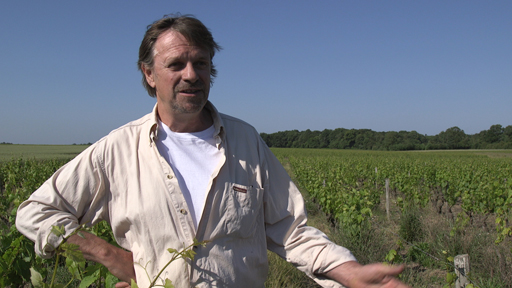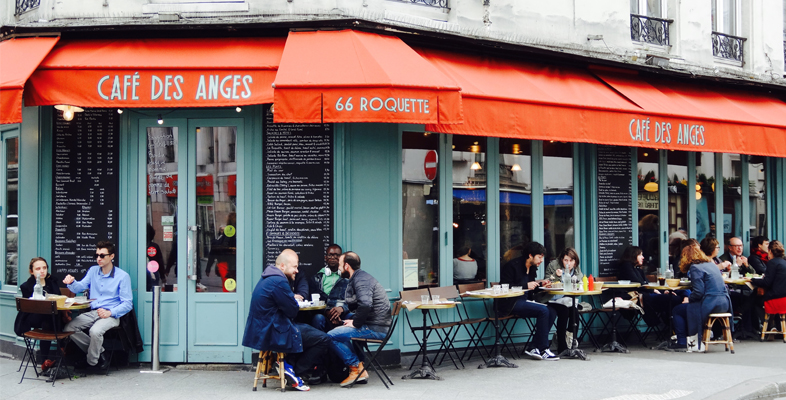4.1 Lionel and talking about the past
Lionel uses verbs in several forms to talk about his past and here you will spend some time identifying them and trying them out.
Activity 15
Authentic audio-visual resources can also make learners more aware of how language structures are used naturally in unscripted language. In the first 40 seconds of the clip, Lionel talks about past events in his life. Listen again to this part of the clip as many times as you like, pausing and repeating the recording as necessary, and complete the gaps in the transcript below with the verb forms you hear.

Transcript
Answer
Je m’appelle Lionel Truet, je suisvigneron à Saint-Ouen les Vignes, qui est un petit village dans la Touraine. Depuis maintenant 25 ans.
Après un court passage on va dire en région parisienne, où j’avais exercé un autre métier que celui de vigneron j’ai travaillé pendant presque 10, 10-12 ans j’ai travaillé à la SNCF. J’étais un jeune cadre dynamique. Et c’est la la passion et le désir de revenir sur le la propriété familiale qui a fait qu’on a changé de vie voilà déjà maintenant près de 25 ans.
Activity 16
Now match each of the sentences to the description of the underlined verb form
Using the following two lists, match each numbered item with the correct letter.
présent
plus-que-parfait
passé composé
imparfait
passé composé
a.4. J’étais un jeune cadre dynamique
b.1. Je suis vigneron … depuis maintenant 25 ans
c.2. J’avais exercé un autre métier
d.5. On a changé de vie voilà déjà maintenant près de 25 ans
e.3. J’ai travaillé pendant presque 10 ans
- 1 = b
- 2 = c
- 3 = e
- 4 = a
- 5 = d
Activity 17
Now match each of the phrases from the recording to the sense conveyed by the verb form.
Using the following two lists, match each numbered item with the correct letter.
a. An action or state of affairs which began in the past and is still continuing in the present
d. An action or event in the past which occurred before another past action or event which is also mentioned
c. An action or event which occurred in the past over a completed period of time
e. A state of affairs in the past which continued over an unspecified period of time
b. An action or event which occurred at a given moment in the past
a.1. Je suis vigneron … depuis maintenant 25 ans (Présent)
b.2. j’avais exercé un autre métier (Plus-que-parfait)
c.4. j’étais un jeune cadre dynamique (Imparfait)
d.5. on a changé de vie voilà déjà maintenant près de 25 ans (Passé composé)
e.3. j’ai travaillé pendant presque 10 ans (Passé composé)
- 1 = a
- 2 = b
- 3 = e
- 4 = c
- 5 = d
Answer
- a – Lionel became a wine producer 25 years ago and he is still a wine producer now. [Présent + ‘depuis’]
- d – His short spell in Paris is the first of two related past events mentioned by Lionel [Plus-que-parfait]
- c – Lionel worked for the SNCF for 10 (or 10-12) years, then this period in his life ended [Passé compose + ‘pendant’]
- e– Lionel was a dynamic young manager (‘un jeune cadre dynamique’) for a period of time that he doesn’t specify precisely [Imparfait]
- b – The change in lifestyle took place at a defined moment in the past (almost 25 years ago) [Passé composé]
Activity 18
Now write sentences about yourself using each of these verb forms to convey the senses described above.
Discussion
Here is a sample answer using all of the verb forms.
Je suis maintenant propriétaire de restaurant depuis 9 mois. Après quelques années à Paris, où j’avais exercé la profession de serveur dans une boîte de nuit prestigieuse, et où j’étais très heureux, je suis venu à Londres en 2006. J’ai travaillé comme chef cuisinier dans un grand hôtel pendant dix ans et en 2016 je suis devenu propriétaire de mon propre établissement.
In Activity 13, you listened to understand the general sense of what Lionel says. Activity 14, you attempted to hear some very specific information. In Activity 15, you used the recording as a source of information about how different verb forms are used in natural speech to express different views of events and actions in the past and their relations to each other.
Understanding why you are listening will help you decide what to focus on as you listen as well as how to prepare yourself before listening. Take as an example watching a televised weather forecast for the week to come.
If you just want a general idea of what the weather will be like, then you might be able to use visual clues such as the symbols on a map; you might decide to revise some general vocabulary relating to weather before listening.
If you are listening to find out when is the best time to go for a long bicycle journey, then you will want more detailed information. If rain is predicted, what time will it start? Is the weather forecast the same for your destination 50 kilometres away as for your point of departure? If the weather is changing, is it getting better or worse as the day progresses? What is the wind direction; will you be cycling into the wind or with it behind you? This kind of detailed listening might require more detailed vocabulary revision focused on the specific information you are trying to obtain.
If you are listening to improve your familiarity with and ability in the language you are learning, then you will need to decide in advance where to direct your attention. This might be an exercise to practice accurately noting numbers, in which case you will concentrate on information about temperatures and wind-speeds. Alternatively, you might want to focus on different constructions used by the presenter to talk about the future: how do his/her language choices very according to whether it is an immediate or more distant future or according to the degree of certainty of the prediction? For this kind of language-focused listening, you would probably want to revise the different ways of talking about the future before watching.
